Too Many Jobs?
What if the path to prosperity called for less work and fewer jobs?
By Thomas J. Elpel, author of Green Prosperity
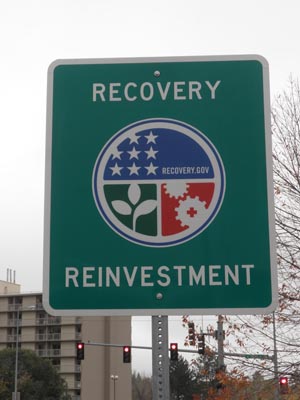
If "Recovery and Reinvestment" signs are beneficial for the economy, why don't we install a million times as many and grow the economy that much faster? |
Nearly every politician campaigns on the promise of strengthening the economy, creating jobs, and putting people back to work. Jobs are a big issue in the best of times and in the worst of times. In fact, jobs are often the only issue we hear about in the news. But what if job creation actually makes us poorer instead of richer? And what if the path to prosperity called for less work and fewer jobs?
Consider those green "Recovery and Reinvestment" signs that sprouted up in every community as part of the federal government's effort to create jobs and get the economy rolling in 2009. How many people were employed mining and refining the metal for all the steel posts and aluminum signs? How many people were employed printing and distributing those signs, or mixing the concrete and mounting the signs in place? If these signs were so beneficial to our economy, why don't we install a million times as many and grow the economy that much faster?
The answer should be obvious. Building signs contributes absolutely nothing towards our standard of living, our quality of life, or the health of our environment. On the contrary, essential natural resources were mined, processed, and used for no net benefit. At the end of the day we are left with fewer natural resources and ultimately higher prices for those resources.
Similarly, consider something as ubiquitous as junk mail. How many tens of thousands of people are employed to cut down trees, mill them into paper, produce ink, do graphic artwork for catalogs and political campaign brochures, address them, mail them, ship them across the country, and sort them into boxes, only to have most of them discarded and recycled or landfilled without even being looked at? Everyone along the way, from the graphic artist to the accountants and the janitors, are glad to have the work, a chance to earn money and keep food on the table, without anyone seeming to notice that they are functionally employed to do nothing more than consume and dispose of our natural resources.
But burning up billions of barrels of oil permanently depletes the resource, devastates the landscape and pollutes the water, contributes to global warming, and results in higher prices at the pump. If we have nothing tangible to show for the investment, then we literally make ourselves poorer by working too much, leaving less wealth to pass along to the next generation.
What if you were offered a job whose sole purpose was to use up our natural resources to ensure that there will be none left for the next generation? Would you take such a job to feed your family? And how would that be different from the work you are doing now?

"Most men would feel insulted if it were proposed to employ them in throwing stones over a wall, and then in throwing them back." -Henry David Thoreau, 1863 |
As Henry David Thoreau pointed out in Life Without Principle in 1863, "Most men would feel insulted if it were proposed to employ them in throwing stones over a wall, and then in throwing them back, merely that they might earn their wages. But many are no more worthily employed now." In fact, our situation is far worse, because throwing stones over a wall is utterly harmless. But we have millions of people employed directly or indirectly in extracting and processing our remaining natural resources for no other purpose than to dispose of them.
Junk mail is only one example among thousands. Worldwide, millions of people are employed to convert raw wealth into garbage destined for landfills. Consider the ubiquitous plastic products at the 'big box' store. How many hundreds of thousands of people are employed to extract and refine the raw materials, design and make molds, build factories, manufacture, ship overseas, and distribute utterly useless products that we then hire more people to transport to a landfill and bury underground for eternity? That is the fate of any product that is neither biodegradable nor recyclable. If you walk into any big box store like a Wal-Mart or a Target, you will find that virtually every shelf in every isle is filled with cheap plastic crap that was made in China, designed to break or wear out quickly, and is destined to be permanently buried in the ground after a few weeks, months, or at best years. Almost nothing on the shelves will last more than a decade.

How many millions of people are employed extracting and processing natural resources for products destined for landfills? |
It's not just plastic crap, either. It is also the appliances that break down within a few months or a few years. From freezers to blenders to food processors, the consumer is better off looking for well-used, forty-year-old American-made appliances, rather than buying brand new appliances that are likely to fail in short order. It is also our disposable tools, the drills, saws, wrenches, and shovels that often break the first or second time you use them, including my all-time favorite, the hammer that bends backwards when you try to drive in a nail!
The Chinese must think that Americans are the stupidest people on the planet. In an unprecedented transfer of resources, we converted one of the poorest nations on earth into a budding superpower. Our infrastructure is falling apart, and our country is practically bankrupt. The Chinese are literally selling us garbage to bury in our landfills, while diverting profits towards constructing bullet trains, installing solar power, launching a space program more ambitious than our own, buying American companies, and loaning operating funds to our federal government while we dig yet a deeper hole for ourselves.
At the heart of this problem is not junk mail, big box stores, or the Chinese, but the perceived economic benefits of "planned obsolescence." In essence, a company that builds a product that is too good is ultimately destined to saturate the market with that product and run itself out of business. If all products were made to last, then people wouldn't need to buy anything, factories would shut down, employees would be laid off, and nobody would have any money to buy anything, even if they wanted to. Making products that are designed to fail is believed to be good for business, and a sure means to keep the economy rolling.
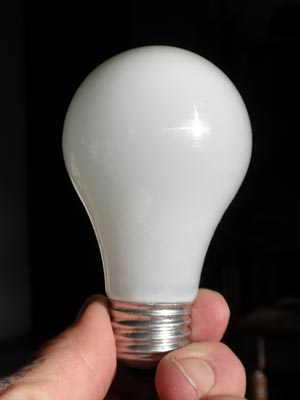
Long-lived light bulbs were not good for sustained business, and so a cartel of light bulb manufacturers created a pact and set standards to invent more fragile bulbs. The industry standard systematically fell from 2,500 hours to 1,500 hours, before the 1,000-hour light bulb was perfected. |
We all know the story of Thomas Edison, and how he tried thousands of different filaments to make a long-lasting incandescent light bulb. Less commonly known is that early light bulbs lasted too long, so long that one bulb has been in continuous use for more than a 100 years in a fire department in Livermore, California. But long-lived light bulbs were not good for sustained business, and so a cartel of light bulb manufacturers created a pact and set standards to invent more fragile bulbs. The industry standard systematically fell from 2,500 hours to 1,500 hours, before the 1,000-hour light bulb was perfected, as detailed in the documentary Pyramids of Waste (also known as The Light Bulb Conspiracy).
The documentary details economic theory about the need to make short-lived products to maintain consumer demand and keep the economy rolling. For instance, Dupont chemists were pretty proud of nylons, first created back in the 1950s. But they were sent back to the lab to rework the formula, because the original stockings were too durable to wear out efficiently. The documentary takes the viewer into the university classroom to see how engineers are formally trained to satisfy employers by dumbing-down products to ensure failure. This is the American way to achieve prosperity. Millions of people are gainfully employed mindlessly cranking out and distributing useless or inferior products. Money flows around and around the loop, and we work our entire lives to keep ahead of engineered entropy. Advertisers encourage disposability by seducing consumers to want newer, glitzy products, even if they haven't worn out older models.
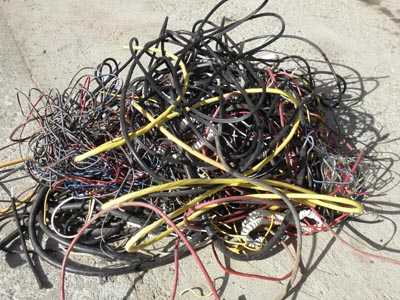
"Every time we discard an electrical cord in the trash instead of recycling it, we effectively raise the cost of copper products everywhere." |
This inverted logic might have made sense when markets were finite and our natural resources seemed infinite, but now the reverse is largely true. Resources are limited, and anything tossed in the trash raises the price of our remaining natural resources. For example, copper is becoming increasingly expensive, and every time we discard an electrical cord in the trash instead of recycling it, we effectively raise the cost of copper products everywhere. Meanwhile, the sheer size of the global marketplace is hard to fathom. It might be possible to saturate one market, but there are always new markets to reach out to. For example, the Skil Corporation manufactures a quality worm-drive Skilsaw, used primarily in wood construction work. Unlike other tools, a Skilsaw doesn't break and get tossed in the trash. It is built to last and almost infinitely repairable. It is a successful product because of its durability, and that is a successful strategy for the company, rather than making an inferior product. Unfortunately, durable products are an exception to the rule.
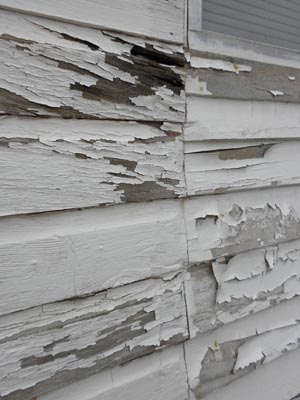
Most houses require an army of maintenance workers just to keep the structures habitable long enough to pay off the mortgage. |
We have built not only a disposable economy, but also a disposable country. Even the houses that shelter us from the elements are little more than temporary shanties, dressed up on the surface. Most houses are designed so poorly that they require a constant influx of fossil fuel energy to keep them cool in summer and to prevent the pipes from freezing in winter. Most houses are so flimsy that you could punch a hole in the wall with a fist. From leaky water heaters to failing asphalt shingles, from carpets that must be replaced and bathrooms that rot out, houses require an army of maintenance workers just to keep the structures habitable long enough to pay off the mortgage. Look around you at the millions upon millions of houses, and consider that almost none of them were engineered to last more than a few decades without major repairs. But all that work is supposedly good for the economy. It keeps people gainfully employed converting raw wealth into more garbage for the landfills.
By the same reasoning, earthquakes, tornadoes, and other natural disasters are often considered good for the economy, because people find work cleaning up the mess, rebuilding infrastructure, and replacing merchandise. Every major oil spill is recorded as a positive economic entry in our national accounts due to the jobs and income "created," while completely ignoring resource loss or damage. According to this kind of logic, America would be richer than ever if we just burned down every house, office, and factory and demolished all our possessions!
Never mind that carbon emissions are spiking upward when they should be tapering off. Never mind that global warming is happening faster than predicted, or that cumulative factors could potentially lead to a runaway greenhouse effect. With the economy in the doldrums and unemployment levels high, all other concerns are secondary. It is imperative that we keep everyone gainfully employed doing important work, like making plastic toys to go with our Happy Meals.
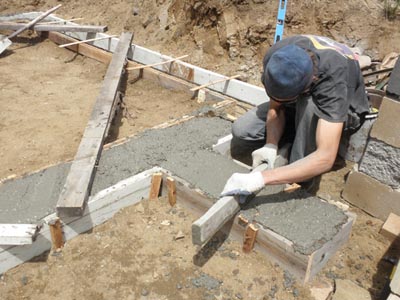
Only a few percent of the labor force is employed producing essential goods and services. |
We are arguably victims of our own success, and our cultural customs are not unlike the historic potlatch ceremonies of Northwestern Native American tribes, where chiefs demonstrated their great wealth and prestige by giving away their possessions, or better yet, destroying them. In a highly productive tribal economy, where material wealth is functionally meaningless, what better way to flaunt your status than by tearing up blankets, punching holes in canoes, burning down your house, or killing your own slaves in front of honored guests? At the very least, it kept the economy rolling.
Our industrial economy is so incredibly productive that it only takes a few percent of the population to supply all of our needs, and everyone else therefore must be employed doing alternative, often meaningless work to pretend they are contributing to society.

In a hunter-gatherer society people made their own clothes, and it could take a couple weeks of dedicated effort to tan hides and make one shirt� Every increase in efficiency means that fewer people are needed to make shirts, which translates to higher unemployment and a need to create alternative work for people to earn money. |
In a hunter-gatherer society people made their own clothes, and it could take a couple weeks of dedicated effort to tan hides and make one shirt. Advancing to the technology of a livestock-driven agricultural society, a specialist might tan hides or spin fibers to make a shirt every day or two. In an industrial society, a worker may crank out a new shirt in an hour or two, and with today's automation, it becomes possible to press a button and spit out a whole pile of shirts. Every increase in efficiency means that fewer people are needed to make shirts, which translates to higher unemployment and a need to create alternative work for people to earn money so they can afford to buy those shirts. As a society, we unconsciously create meaningless work to keep people busy doing work that doesn't actually produce anything; it effectively redistributes wealth from those who produce it to those who don't.
For example, H&R Block, Inc. has approximately 11,000 company-owned and franchised retail locations in the United States, employing a great many people to help American citizens pay - or avoid paying - their taxes. This is just one company out of hundreds involved in the tax industry. We might be glad to pay a little money for an accountant or a do-it-yourself software package, but that expense is effectively a tax. We could easily invest that money towards something useful, such as paying off the federal deficit, investing in education or the environment, or in a better space program. But instead we redistribute the money to pay for office buildings, desks, computers, lava lamps, cleaning supplies, and employee wages for an army of people who don't actually contribute to the economy. Most of that work would be unnecessary if we scaled back the IRS, greatly simplified the tax code, and collected "green" taxes against products that are harmful to the planet.

We are in the midst of the sixth mass extinction, as a result of the collective human effort to exploit all remaining marketable resources before our grandchildren reach adulthood. |
The irony is that job creation is intended to sustain the economy, but there is nothing remotely sustainable about employing people to decimate life on earth. There have been five past mass extinctions in the history of life on earth. From asteroid impacts to massive volcanic eruptions that smothered the planet, each event permanently wiped out half or more of all species on the planet. In each case it took tens of millions of years for the surviving species to diversify and fill the ecological voids. Now we are in the midst of the sixth mass extinction, as a result of the collective human effort to exploit all remaining marketable resources before our grandchildren reach adulthood. We have destabilized the climate, with the forecast calling for more 'job-building' natural disasters ranging from floods to droughts, heat waves, tornadoes, hurricanes, rising sea levels, and now even "superstorms." Meanwhile, grasslands are turning to deserts, tropical forests are being logged to oblivion, the Arctic ice sheet is rapidly melting away, coral reefs are dying, and the oceans are predicted to be fished out by the middle of the century. We are expected to wipe out half of all life on earth this century, and politicians everywhere are worried about the unemployment rate.
But the reality is that committing labor and natural resources towards work that doesn't produce anything ultimately results in a net drag on the economy. It raises costs and makes us poorer. And that is the sad reality of our present economic situation: the faster the economy grows, the more impoverished we ultimately become!
Conversely, the path to building a sustainable and prosperous economy is to eliminate extraneous work and dedicate our resources towards investments that make a tangible, positive difference in our world. Call it "green prosperity." The more we invest in conservation and eliminating waste, the wealthier we become.
Prosperity in the twenty-first century will be created by those who seek profit by making the world a better place. Ecopreneurs will out-compete inefficient, abusive industries by starting green businesses that close the loop on wasted materials, energy, time, money and labor. They will heal wasted ecosystems and restore biodiversity at a profit while delivering useful goods and services to the public. Homeowners too, will profit by seeking ways to eliminate everything from high energy bills to mortgage payments–even eliminating the need for a regular job. But there is no need to wait for such a future to come, for the revolution has already started. The door is wide open, and anyone can walk the path to green prosperity, changing the world every step along the way.
Taking one small step, an individual can install a solar water heater or hire a contractor to install it for them. The solar water heater reduces a household's dependence on fossil fuels, lowers the utility bill, and brings a timely return for the investment. By making similar investments and upgrades in a house, a person can trim the utility bill down to almost nothing, and even install photovoltaic panels to run the meter backwards and wipe out the utility bill entirely. In fact, it is a whole lot easier to avoid expenses and debt in the first place than it is to earn a fat paycheck and spend one's way out of debt.
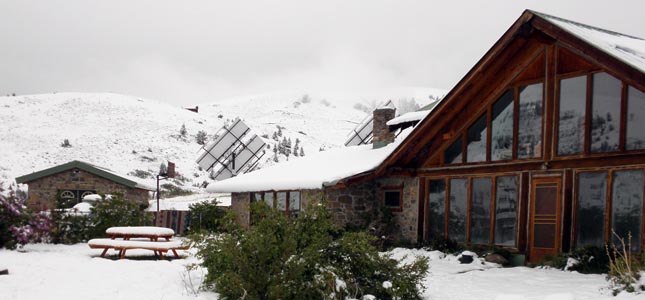
There is no greater feeling of security than having a durable and efficient home with no mortgage and no utility bill. The greatest job security is not needing a job at all. |
As a young adult, I hated the idea of getting a job and paying bills. I abhorred the idea of spending my entire life working to pay a mortgage, rent, utilities, car payments, school loans, or any other kind of bills. I didn't mind working, but I wanted it to count for something. I have succeeded in life by avoiding extraneous work, rather than creating it. I successfully avoided paying rent or a home mortgage, college loans, car payments, big utility bills, or any other substantial recurring expenses. Indeed, there is no greater feeling of security than having a durable and efficient home with no mortgage and no utility bill. The greatest job security is not needing a job at all, and it was that freedom that allowed me to indulge in my writing until I turned it into a successful career.
While there are many pathways to eliminating expenses, debt, and the need for jobs, as described in my article Escaping the Job Trap, the reality is that most people will never walk that path on their own. As it is, shockingly few people install solar water heaters or properly insulate their homes, even though the economics are already good, and tax incentives often make it even better. But it takes a certain amount of know-how to install one's own solar water heater, and a certain amount of knowledge just to competently hire a contractor to do it for you. As a result, there are disappointingly few solar water heaters in operation in our country.
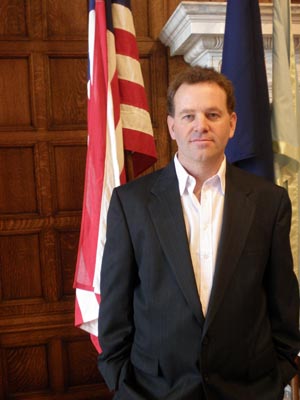
We can build a green economy, end poverty, and conserve resources for future generations. But first we have to stop creating meaningless work and consider what kind of world we really want to bring into existence. |
It would be far better to provide incentives for utilities to install and maintain solar water heaters themselves. For example, if a utility pays for and installs a solar water heater on a home, then the utility should profit from most of the energy savings. The customer could get a small reduction on their gas or electric bill, while the utility would continue to charge the customer as if they were using almost as much power as before. But the energy saved would be sold elsewhere, so that the utility would get paid twice for the same energy. It would be in the utility's best interest to install identical, durable solar water heaters on every house, in order to reduce maintenance costs.
With the right incentives to spur investment in conservation and alternative energies, we could create real jobs and put millions of people to work weaning our civilization off of fossil fuels once and for all. In fact, with appropriate incentives for companies to manufacture long-lasting products and recycle everything, it wouldn't take long to create a futuristic world where everyone has everything they need, and nobody really has to work any more.
That might be a little hard to imagine, but it wouldn't be that hard to achieve with a little commonsense. I know from experience that it is possible to break free from the rat race, live in prosperity with minimal bills, and choose whether or not you work. It is the freedom to pursue your own Dreams and make yourself a better person and the world a better place. We can build a green economy, end poverty, and conserve resources for future generations. But first we have to stop creating meaningless work and consider what kind of world we really want to bring into existence. Indeed, re-envisioning the meaning of work is the only chance we have of saving the planet and leaving something for the next generation.
 Thomas J. Elpel founded Green University ® LLC in Pony, Montana. He is the author of Green Prosperity, Roadmap to Reality, and Living Homes.
Thomas J. Elpel founded Green University ® LLC in Pony, Montana. He is the author of Green Prosperity, Roadmap to Reality, and Living Homes.























